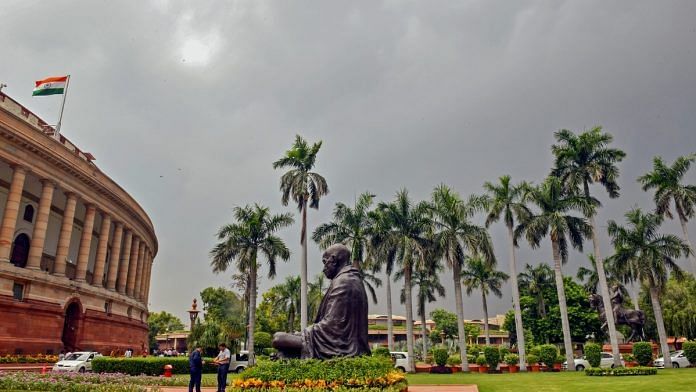New Delhi: Even as they continued to raise objections over the Hindi titles of the three bills that seek to replace the Indian Penal Code (IPC), the Code of Criminal Procedure (CrPC) and the Indian Evidence Act, opposition lawmakers Friday pointed out what they believe are inconsistencies and loopholes in the bills at a parliamentary panel meeting, ThePrint has learnt. Some opposition MPs, who are members of the parliamentary panel on Home Affairs, also said that they were of the opinion that the bills are poorly drafted.
The 28-member panel headed by Bharatiya Janata Party (BJP) MP Brijlal had Thursday started a three-day deliberation to scrutinise the Bharatiya Nyaya Sanhita 2023, Bharatiya Nagarika Suraksha Sanhita 2023 and the Bharatiya Sakshya Bill 2023 — referred to the Parliamentary Standing Committee on Home Affairs after being introduced in the Lower House by Union Home Minister Amit Shah on the last day of the monsoon session.
The Hindi titles of the three bills ruffled feathers, with MPs from the Dravida Munnetra Kazhagam (DMK), the Congress and the Biju Janata Dal (BJD) objecting to them. MPs from the DMK and BJD said this amounted to violation of Article 348 of the Constitution, which mandates that bills introduced in either House of Parliament have to be in English.
“An opposition MP said that the Hindi title of the bills has resulted in diverting the focus from its content to just its name. The southern and regional parties have an issue and it’s legitimate,” a source in the parliamentary panel told ThePrint.
However, Union Home Secretary Ajay Bhalla, who was present at the meeting, maintained that the Hindi titles do not violate the provision of the Constitution as the text of all three bills is in English.
Also read: Parliament debate isn’t extinct yet, Monsoon session shows
‘Poorly drafted, many inconsistencies’
Flagging how the three bills seem to be poorly drafted and riddled with inconsistencies, one of the opposition MPs said Section 23(2) of the Bharatiya Sakshya (Indian Evidence) Bill, that deals with confession to police officers, states that any person, while in the custody of a police officer, will have to make a confession in the immediate presence of a magistrate.
“The MP said the new evidence bill nowhere defines whether the magistrate will be a judicial or executive magistrate. The original Indian Evidence Act (1872) clearly defines a magistrate,” a parliamentary source present in the meeting Friday told ThePrint.
The source added that opposition MPs also pointed out other inconsistencies in the bills at the meeting.
An opposition MP told the panel that while Section 303 of the old IPC (individual who has committed murder while serving life imprisonment will be punished by death) was struck down by the Supreme Court in the Mithu Vs State of Punjab in 1983 on the grounds that it was against the right to life and equality, it has been retained in the Bharatiya Nyaya Sanhita under Section 102.
“The MP said that this is incongruous with the Mithu judgment,” the source added.
Mental illness not properly defined
Another source added that a DMK MP pointed out how Section 2(19) of the Bharatiya Nyaya Sanhita does not define mental illness but just says that it “shall have the meaning assigned to it in the Mental Healthcare Act, 2017”.
The 2017 Act defines mental illness as a “substantial disorder of thinking, mood, perception, orientation or memory that grossly impairs judgment, behaviour, capacity to recognise reality or ability to meet the ordinary demands of life, mental conditions associated with the abuse of alcohol and drugs, but does not include mental retardation which is a condition of arrested or incomplete development of mind of a person, specially characterised by subnormality of intelligence”.
DMK MP N.R. Elango, the source added, pointed out that this definition will create problems under the new law, where a crime committed by a person suffering from mental illness falls under “General Exception” category, and will not be considered an offence.
Arguing that there is a difference between legal insanity and medical insanity, Elango told the panel that mental illness will have to be clearly defined in the new bill.
“The MP said that otherwise, if a person who has committed a crime is mentally retarded, he can end up facing prosecution but if it is proved that a person who has committed a crime has a mental condition associated with abuse of alcohol or drugs, he can go free,” the source said.
A second source said that senior officials from the ministries of home and law and justice conceded before the parliamentary panel that the three bills need more fine-tuning.
The panel will continue with their deliberations Saturday.
Opposition MPs, including Digvijaya Singh of the Congress and the DMK’s Dayanidhi Maran, also questioned the need to bring in the new bills.
“The MPs said this has resulted in rearranging old provisions. For instance, Section 302 (committing murder) of IPC has now been replaced by Section 101. The rearrangement will take many years to get used to,” an MP, who attended the meeting Friday, quoted Maran as saying.
(Edited by Smriti Sinha)
Also read: Modi govt introduces bill to replace CJI with minister in EC selection panel, negates SC order



